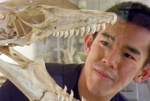…so there I was looking at one of my favourite science journal websites, deservedly and authoritatively simply called ‘Science‘, when my attention was caught by the section titled ‘Careers‘. Seeing I had committed myself to a career as a science journalist and writer, and I was armed with over 20 years in commercial media, nine as a journalist, and a Masters in Science Journalism under my belt, I thought “let me see what opportunities await me”.
Imagine my surprise, nay shock, when a search under ‘Writer’ left me with the following message: “The specified search produced no results. Try changing your criteria or use the form below to save your search and create a Search Agent”
Thinking I must have filled in the multitude different fields incorrectly, I tried a different combination. The result was the same. My journalist instinct kicked in and I went straight to the source, and inquired of Tracy Holmes, the Worldwide Associate Director of Science Careers, if there was any need for science writers in the world of Science (capital intended), or if I was just filling in the search field incorrectly.
Her reply (within an hour I must add) was the following:
Hi Daryl,
We don’t publish many ads of this type on sciencecareers.org. The majority of our ads are for more traditional research careers. Typically we do run ads for science editors, we publish our own editorial vacancies this way and both Elsevier and Nature have advertised for editors on our site. Kind regards, Tracy.
And that, in my opinion, is what’s wrong with science (no capital intended): a reluctance to accept science writers into the ‘fold’ as it were; the refusal, it seems, to acknowledge the specialisation needed of a journalist/writer to write about science; and the reluctance to share its research and endeavours with the great unwashed – an aloofness, if you like.
The reality is that science needs science writers; because without them, the world would be more distrustful of science and its intense specialisation; because science research needs funding, and funding is directed where there’s a need or a public fascination; because science writers give real purpose to what science does; and because, at the end of the day, scientists, just like like everyone else, sit down to take a crap.
So come on science…and Science…give science writers a break.
*You can read the work of Ed Yong on his excellent Discovery blog Not Exactly Rocket Science



